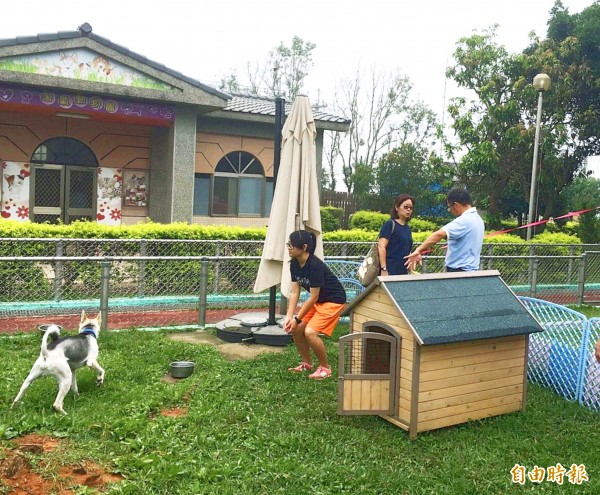《TAIPEI TIMES》 Animal shelters crowded due to poll focus: activist

A girl at Nantun Animal Shelter in Taichung plays with a dog on March 3 last year. Photo: Huang Chung-shan, Taipei Times
NO-KILL POLICY: Shelters have been crowded since it in 2017 became illegal to put down animals that do not pose a threat, and advocates suggested catching fewer animals
By Lin Chia-nan / Staff reporter
Public animal shelters in eight municipalities last year received more animals than their capacities allowed, which an animal rights advocate said was due to official negligence in the run-up to the Nov. 24 local elections.
Public shelters in Taipei, Tainan, Taoyuan, Chiayi City and Hsinchu, Nantou, Yunlin and Pingtung counties have been housing more animals than they were designed for, Council of Agriculture data for November last year showed.
The Taipei shelter housed a total of 1,120 animals, almost double its maximum capacity of 610, the data showed.
Shelters in Taichung and Kaohsiung, as well as Chiayi, Penghu and Kinmen counties, were at more than 90 percent capacity, the data showed.
Overcrowding at public animal shelters has been a problem since the implementation of a “no-kill” policy on Feb. 6, 2017, Council of Agriculture Department of Animal Industry Deputy Director Wang Chung-shu (王忠恕) said yesterday.
The no-kill policy stems from an amendment to Article 12, Paragraph 7 of the Animal Protection Act (動物保護法) passed in 2015, which previously stated that shelters could put down stray animals not adopted after 12 days in shelters.
After the amendment took effect in 2017, public shelters could only kill animals that have incurable diseases or infectious conditions, or pose great danger to public safety.
Instead of building more shelters, which is difficult in urban areas such as Taipei, the council has pushed local shelters to improve accommodation quality, promote adoption and neuter stray animals to reduce their numbers, Wang said.
Many local governments last year neglected their duties to supervise animal shelters, because they were preoccupied with the elections, Taiwan Animal Protection Monitor Network executive director Ho Tsung-hsun (何宗勳) said, but added that New Taipei City, Tainan and Taitung municipal authorities made a better effort.
Shelters should control the number of animals they house by only catching those that threaten people’s lives, he said.
In addition to reducing numbers of stray animals through the the “trap-neuter-return” program, the government should encourage animal adoption through diversified channels, including training dogs to guard schools, police stations and farms, Ho said.
Campaigners have called on the government to raise the penalty for people abandoning pets, who currently face a fine of NT$30,000 to NT$150,000.
However, Wang said that heavier fines would be disproportionate and improving animal protection education would be more effective than harsher punishments.
新聞來源:TAIPEI TIMES















